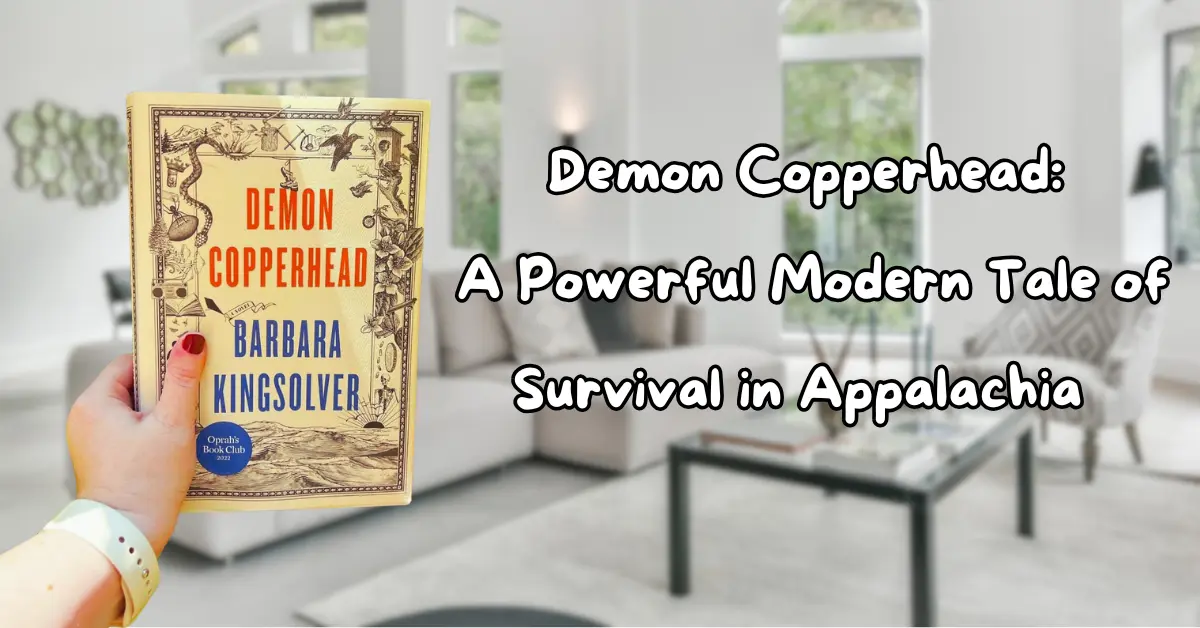Barbara Kingsolver’s Demon Copperhead is a deeply emotional and raw narrative that pulls readers into the harsh realities of addiction, poverty, and the fight for survival in rural Appalachia. Inspired by Charles Dickens’ classic David Copperfield, Kingsolver modernizes the tale while addressing significant social issues affecting modern America. In this review, I will walk you through what makes this novel remarkable, its challenges, and why it’s a must-read.
Demon Copperhead Summary: A Story Rooted in Reality
At its heart, Demon Copperhead tells the story of a young boy born into unfortunate circumstances in the Appalachian mountains. Raised by a drug-addicted mother and growing up in a system that continually fails him, Demon’s journey is filled with challenges. From an abusive stepfather to the broken foster care system and the devastating impact of addiction, Demon’s resilience becomes his saving grace. Kingsolver gives readers an unflinching look at the hardships of growing up in poverty, compounded by the opioid epidemic that has ravaged many communities in America.
Why Demon Copperhead Stands Out: An Engaging Story with Real Issues
One of the strengths of Demon Copperhead lies in its vivid portrayal of Appalachian life. Kingsolver has spoken about her desire to write the “great Appalachian novel,” and she certainly captures the unique essence of the region. From the coal-filled mountains to the small, struggling towns, her depiction of the community is both poignant and realistic. The characters are just as compelling—each one deeply human and crafted with care.
Kingsolver’s writing shines through her protagonist. Demon’s voice is raw, real, and unforgettable. He is both deeply observant and resilient, traits that help him survive the challenges of a broken system. His reflections on addiction are particularly powerful, providing readers with a clear sense of the emotional and physical toll it takes.
For example, Kingsolver beautifully captures Demon’s understanding of addiction in the following passage:
“I had roads to travel before I would know it’s not that simple, the dope versus the person you love. That craving can ratchet itself up and up inside a body and a mind, at the same time that body’s strength for tolerating its favorite drug goes down and down.”
The authenticity of such moments makes Demon Copperhead an emotional and thought-provoking read, as Kingsolver does not shy away from exposing the cracks in the social systems that should protect vulnerable individuals like Demon.
Demon Copperhead Review: A Fresh Take on a Classic
Fans of David Copperfield will recognize many elements of Dickens’ original story in Demon Copperhead, from its episodic structure to the memorable cast of characters. Kingsolver skillfully reimagines these characters in a modern context, giving them unique nicknames and personalities that jump off the page. Demon’s journey mirrors David Copperfield’s, but with a distinctly Appalachian flavor.
While the novel addresses heavy themes, such as poverty, addiction, and systemic failure, Kingsolver’s writing is surprisingly light and accessible. At 546 pages, Demon Copperhead could have been a dense read, but Kingsolver keeps it moving with a breezy, episodic structure that makes the novel engaging and hard to put down. Despite its length, the story flows naturally, and the characters feel like real people with real struggles, making it an unforgettable reading experience.
Powerful Social Commentary
Demon Copperhead is more than just a retelling of David Copperfield; it’s a deeply insightful commentary on modern-day social issues. Kingsolver takes on topics like the opioid epidemic and the broken foster care system, highlighting how these challenges devastate communities like the one Demon grows up in. She does so with empathy, never judging her characters, but instead showing the circumstances that drive their actions.
The novel doesn’t shy away from the harsh realities of addiction, but it also shows the resilience and resourcefulness of people living in poverty. Demon’s journey is a testament to the power of survival, even in the most desperate of circumstances. The characters around him are not as fortunate, often succumbing to the challenges they face, but Demon’s strength and talent as an artist offer a glimmer of hope in an otherwise bleak world.
A Note on Mature Content
For readers considering this book, it’s important to note that Demon Copperhead does contain some mature content. The novel deals with difficult subjects such as addiction, abuse, and poverty, and some scenes may be emotionally challenging for certain readers. There is also sexual content that might not be suitable for younger audiences. However, these elements are integral to the story and add depth to the characters and the issues they face.
Final Thoughts on Demon Copperhead
Overall, Demon Copperhead is a must-read for anyone looking for a powerful, thought-provoking novel that addresses real-world issues. Barbara Kingsolver’s beautiful prose, coupled with her deep empathy for her characters, makes this a truly compelling read. The novel’s exploration of poverty, addiction, and survival will stay with you long after you’ve turned the last page. While it may not be the lightest read, it’s an important one, shedding light on the struggles faced by many communities today.
If you’re a fan of David Copperfield or are simply looking for a novel that explores the resilience of the human spirit in the face of overwhelming adversity, Demon Copperhead is definitely worth picking up.
FAQs about Demon Copperhead
What is Demon Copperhead about?
Demon Copperhead tells the story of a boy growing up in the Appalachian mountains, dealing with poverty, addiction, and a broken foster care system. It’s a modern retelling of David Copperfield with a focus on the social issues affecting rural America.
Is Demon Copperhead based on a true story?
While the novel is not based on a specific true story, it reflects real social issues such as the opioid epidemic and the foster care system. Barbara Kingsolver drew inspiration from the struggles faced by communities in Appalachia.
Is Demon Copperhead appropriate for all readers?
The novel contains mature themes such as addiction, abuse, and sexual content. While it is a powerful and well-written book, it may not be suitable for younger readers or those sensitive to such topics.
Why is Demon Copperhead compared to David Copperfield?
Barbara Kingsolver’s Demon Copperhead is a modern reimagining of Charles Dickens’s David Copperfield. Both novels follow a young protagonist navigating difficult circumstances, but Kingsolver’s version is set in modern-day Appalachia and addresses contemporary social issues.

